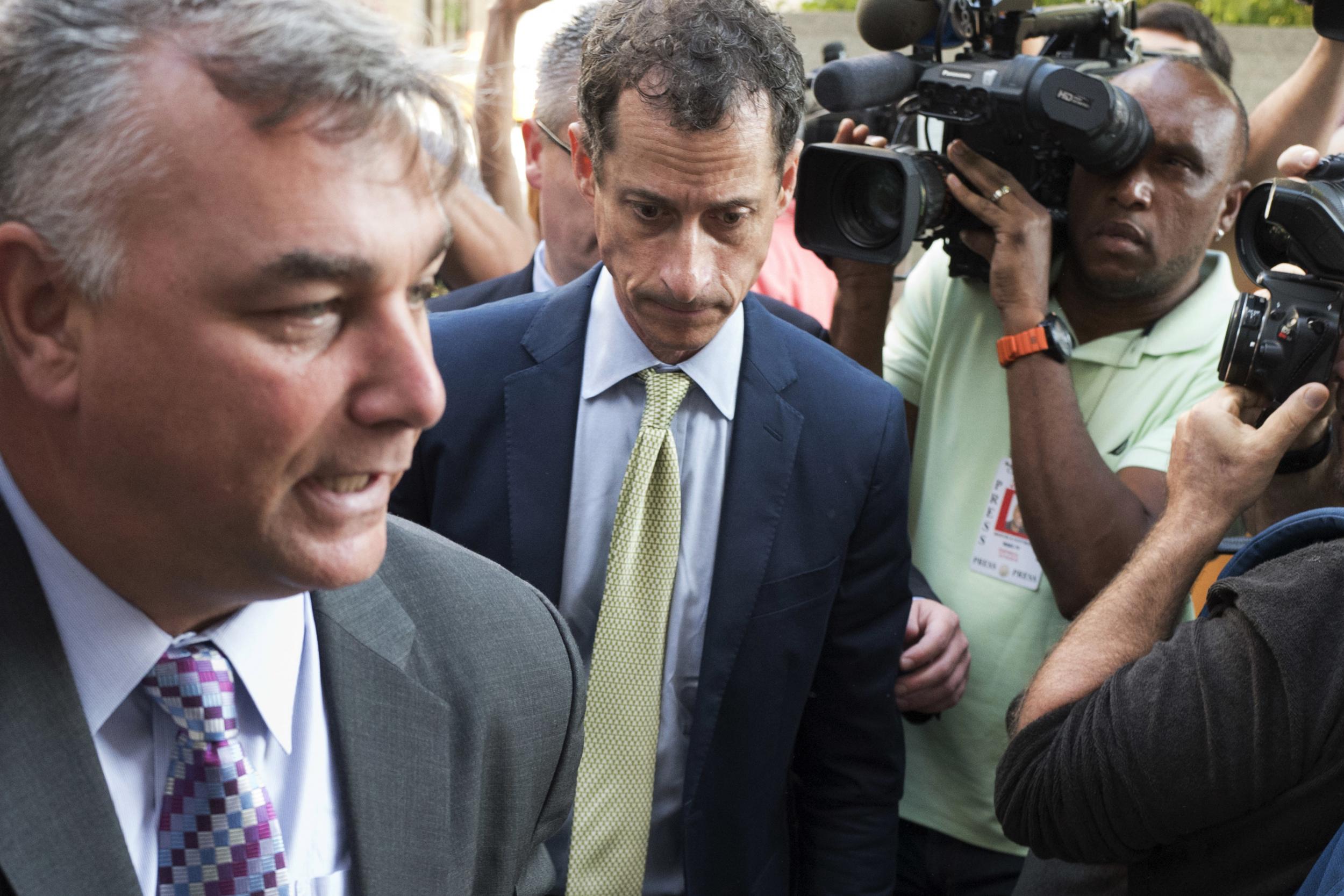Anthony Weiner sentenced to 21 months in jail for sexting an underage girl
The prison sentence marks an incredible fall from political grace in the last few years

Your support helps us to tell the story
From reproductive rights to climate change to Big Tech, The Independent is on the ground when the story is developing. Whether it's investigating the financials of Elon Musk's pro-Trump PAC or producing our latest documentary, 'The A Word', which shines a light on the American women fighting for reproductive rights, we know how important it is to parse out the facts from the messaging.
At such a critical moment in US history, we need reporters on the ground. Your donation allows us to keep sending journalists to speak to both sides of the story.
The Independent is trusted by Americans across the entire political spectrum. And unlike many other quality news outlets, we choose not to lock Americans out of our reporting and analysis with paywalls. We believe quality journalism should be available to everyone, paid for by those who can afford it.
Your support makes all the difference.Former New York congressman Anthony Weiner has been sentenced by a judge to 21 months in jail following his latest sexting scandal.
The one-time mayoral candidate pleaded guilty to one charge of transferring obscene material to a minor. Prosecutors say he broke the law by having illicit contact with a 15-year-old girl using Skype and Snapchat.
Weiner was hoping that he might be sentenced to probation instead of hard time in prison, and his lawyers had argued that their client was sick and in need of therapy, not incarceration.
"I have a sickness, but I do not have an excuse," Weiner said in May when he plead guilty to the charge of transmitting obscene material to a minor.
The prison sentence marks a new low in Weiner's stunning personal and political fall from grace. As a member of Congress, he gained notoriety as a feisty speaker on the House floor. Now, as he begins his sentence, Weiner has lost his career and his wife, Huma Abedin, a top aide to Hillary Clinton who announced she would seek divorce after the latest sexting scandal. Ms Abedin filed for divorce on the same day that Weiner plead guilty in May.
The conviction follows media reports in 2016 alleging that Weiner had sexted with a 15-year-old girl, sparking investigations by the FBI and the New York Police Department. Weeks earlier, a photo Weiner sent to a woman had been discovered showing Weiner lying in bed with his toddler next to him.
That sexting scandal was the third to Weiner has faced, although both of the others involved women over the age of 18. The first scandal, in 2011, followed after Weiner sent a photo of his genitals - concealed by boxer briefs - to a 21-year-old college student who followed him on Twitter. Weiner initially refused to admit that it was him in the photograph, before ultimately admitting ownership of the picture during a press conference in New York. He later resigned from Congress as a result of the scandal.
The second scandal occurred in 2013 during Weiner's campaign to be mayor of New York. Hoping to revitalise his public image in the wake of the scandal that ended his Congressional career, Weiner quickly became the front runner in the Democratic primary. But, pictures and sexts he had sent to a 22-year-old woman were obtained by the press, sending his campaign into a spiral. He went on to finish in fifth place in the race to become mayor of New York, after losing the trust of the voters in the city.
But the latest scandal stands out in that it may have contributed to Donald Trump winning the 2016 election.
After media reports noted that Weiner had sexted with a minor, Weiner became the target of an FBI investigation, and had his laptop seized. During that investigation, agents discovered emails on the computer that appeared to be linked in some way to the scandal surrounding Hillary Clinton's use of a private email server when she served as Secretary of State during the Barack Obama administration.
Former FBI Director James Comey, just days before the 2016 election, then sent a letter to Congress announcing that his agency would be looking into the emails that they had freshly found. That public admission that the FBI was looking at the emails in relation to the Clinton scandal rocked the campaign with very little time until voting day. Mr Comey had previously announced that the FBI had found no evidence of criminal activity related to the emails, and later noted that they had uncovered no further evidence of wrongdoing.
Still, although the FBI did not find anything more of note in the Weiner emails, the emails did bring new attention to the issue that had dogged Ms Clinton's candidacy and raised questions about her trustworthiness.
Ms Clinton, since her surprise electoral loss, has repeatedly said that she thinks that Mr Comey's announcement that the FBI was looking at those emails is the reason she lost the election.
Join our commenting forum
Join thought-provoking conversations, follow other Independent readers and see their replies
Comments